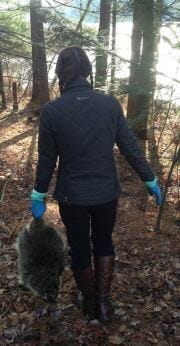One Woman Is Revolutionizing the Fur Industry. By Using Roadkill.
Paquin once fought resource misuse in another capacity, traveling the world as a global sustainability consultant. But after crisscrossing the world and living in Denmark for seven...
One Woman Is Revolutionizing the Fur Industry. By Using Roadkill.
Paquin once fought resource misuse in another capacity, traveling the world as a global sustainability consultant. But after crisscrossing the world and living in Denmark for seven...

Paquin once fought resource misuse in another capacity, traveling the world as a global sustainability consultant. But after crisscrossing the world and living in Denmark for seven years, Paquin found herself a single parent unwilling to travel as frequently for work.
And so she returned to the States and revisited a business idea that had germinated for years: fur accessories made from the casualties of our roadways.
“It’s so much a part of everyday life to see these animals,” says Paquin. “Who of us doesn’t look away? You don’t want to see it because when you fully soak in the meaning of what happened, it’s emotionally draining.”
Paquin returned to the States and revisited a business idea that had germinated for years: fur accessories made from the casualties of our roadways.
So, how many animals do you think get killed on the streets of this country every year? Whatever your guesstimate, go higher: according to Culture Change, it’s approximately 1 million a day, or 365 million a year. By comparison, Born Free USA reports that approximately 50 million animals are killed every year for their fur. (As Culture Change puts it, “only meat-eaters take a larger toll than its motorists.”)
“The scale of it is so overwhelming — you can’t possibly wrap your head around and the suffering that went into those numbers,” says Paquin, an animal lover who grew up on a dairy farm, worked on organic farms as a young adult, and even owned two ferrets when she was in Denmark.
There may be a nascent movement towards reappropriating roadkill as ethical meat, but sustainable fur couture? Paquin was in uncharted territory. No matter: In short order she located a taxidermist in Vermont who schooled her in the nitty-gritty of skinning and — oof — scraping an animal pelt ahead of the tanning process. Her induction came in the form of a deceased raccoon: “We both had a shot of whiskey, I put some peppermint oil under my nose, and we found a branch in the woods to hang this thing from. It was super intense.”
After the prep work, Paquin ships her furs to a tannery in Idaho, one of the very few in the country that will work with partial pelts. As for what she does with the bodies afterwards, Paquin leans on her Native American heritage, taking them into the woods, placing them in fetal position, and then saying a prayer — “the giveaway prayer, a prayer of thanks. You’re thanking the animal spirit.”
Once the pieces come back from Idaho, the wait for a commission begins. Through sheer word of mouth, the customer drumbeat has been steady. Bespoke pieces have thus far included neck muffs, velvet-lined hand muffs, leg warmers, trapper hats, gauntlet gloves, and alpaca wool hats with fur pom-poms. Lest one fear the wrath of PETA, Paquin also sews a sterling silver badge to the outside of the piece, indicating it as a one of a kind, principled product: “People need to look at the fur and say okay, that’s Petite Mort, it’s an ethical fur.” All pieces are made to measure and start at $1000, save for the hats, which range from $380 to $500. (Men, FYI, are big fans of the leg warmers.)
“We both had a shot of whiskey, I put some peppermint oil under my nose, and we found a branch in the woods to hang this thing from. It was super intense.”
Though Paquin recovers many of her animals herself, the Wayland, Massachusetts, resident hardly lacks for collaborators. Hunters, wildlife officers, highway patrolmen, and other contacts get in touch when they’ve spotted a salvageable animal. Over the last year she’s recovered or received bears, fox, beaver, raccoons, otters, baby fawn, mink, and even a couple of fisher cats. (Paquin once received a coyote that had sat in a hunter’s freezer for months; it took three days to thaw.) All animals are registered with the Massachusetts Division of Fisheries and Wildlife, and customers receive details about the animal’s recovery as well as clues into the life it might have lived. “Each animal has a story,” she says.

As for the name of her collection, Petite Mort literally translates from the French as “the little death” and colloquially refers to a woman’s temporary state after an orgasm. Paquin appreciated the double meaning of the term vis a vis both the expired animals and the sumptuousness of her pieces: “That state that requires full body participation is where my I want my customer to be.”
Currently in search of investors to expand the enterprise, Paquin lives for the day when fur will be a widespread wearable material for the mindfulness set.
“Fur is a very sensual and luxurious product that has been shamed and shameful for a very very long time,” she says. “This is a shameless fur. This is champagne all night and no hangover.”
As for her shorter-term goals?
“Right now I’m just trying to sell roadkill to people,” she says with a laugh.
Top: Courtesy Sophia Jagger Moon.
Follow us

This work is licensed under a Creative Commons Attribution-NoDerivatives 4.0 International License.
Want to republish a Modern Farmer story?
We are happy for Modern Farmer stories to be shared, and encourage you to republish our articles for your audience. When doing so, we ask that you follow these guidelines:
Please credit us and our writers
For the author byline, please use “Author Name, Modern Farmer.” At the top of our stories, if on the web, please include this text and link: “This story was originally published by Modern Farmer.”
Please make sure to include a link back to either our home page or the article URL.
At the bottom of the story, please include the following text:
“Modern Farmer is a nonprofit initiative dedicated to raising awareness and catalyzing action at the intersection of food, agriculture, and society. Read more at <link>Modern Farmer</link>.”
Use our widget
We’d like to be able to track our stories, so we ask that if you republish our content, you do so using our widget (located on the left hand side of the article). The HTML code has a built-in tracker that tells us the data and domain where the story was published, as well as view counts.
Check the image requirements
It’s your responsibility to confirm you're licensed to republish images in our articles. Some images, such as those from commercial providers, don't allow their images to be republished without permission or payment. Copyright terms are generally listed in the image caption and attribution. You are welcome to omit our images or substitute with your own. Charts and interactive graphics follow the same rules.
Don’t change too much. Or, ask us first.
Articles must be republished in their entirety. It’s okay to change references to time (“today” to “yesterday”) or location (“Iowa City, IA” to “here”). But please keep everything else the same.
If you feel strongly that a more material edit needs to be made, get in touch with us at [email protected]. We’re happy to discuss it with the original author, but we must have prior approval for changes before publication.
Special cases
Extracts. You may run the first few lines or paragraphs of the article and then say: “Read the full article at Modern Farmer” with a link back to the original article.
Quotes. You may quote authors provided you include a link back to the article URL.
Translations. These require writer approval. To inquire about translation of a Modern Farmer article, contact us at [email protected]
Signed consent / copyright release forms. These are not required, provided you are following these guidelines.
Print. Articles can be republished in print under these same rules, with the exception that you do not need to include the links.
Tag us
When sharing the story on social media, please tag us using the following: - Twitter (@ModFarm) - Facebook (@ModernFarmerMedia) - Instagram (@modfarm)
Use our content respectfully
Modern Farmer is a nonprofit and as such we share our content for free and in good faith in order to reach new audiences. Respectfully,
No selling ads against our stories. It’s okay to put our stories on pages with ads.
Don’t republish our material wholesale, or automatically; you need to select stories to be republished individually.
You have no rights to sell, license, syndicate, or otherwise represent yourself as the authorized owner of our material to any third parties. This means that you cannot actively publish or submit our work for syndication to third party platforms or apps like Apple News or Google News. We understand that publishers cannot fully control when certain third parties automatically summarize or crawl content from publishers’ own sites.
Keep in touch
We want to hear from you if you love Modern Farmer content, have a collaboration idea, or anything else to share. As a nonprofit outlet, we work in service of our community and are always open to comments, feedback, and ideas. Contact us at [email protected].by Meaghan Agnew, Modern Farmer
December 2, 2014
Modern Farmer Weekly
Solutions Hub
Innovations, ideas and inspiration. Actionable solutions for a resilient food system.
ExploreExplore other topics
Share With Us
We want to hear from Modern Farmer readers who have thoughtful commentary, actionable solutions, or helpful ideas to share.
SubmitNecessary cookies are absolutely essential for the website to function properly. This category only includes cookies that ensures basic functionalities and security features of the website. These cookies do not store any personal information.
Any cookies that may not be particularly necessary for the website to function and are used specifically to collect user personal data via analytics, ads, other embedded contents are termed as non-necessary cookies.